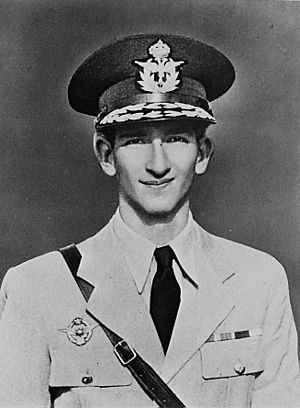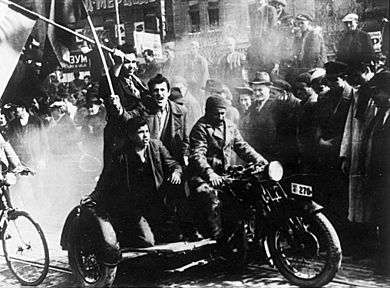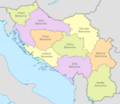Yugoslav coup d'état facts for kids
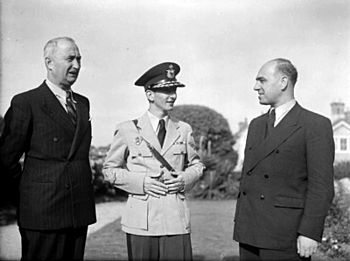
Dušan Simović, King Peter II of Yugoslavia, and Radoje Knežević in London, June 1941. Peter II was declared of age and placed on the throne as a result of the coup.
|
|
| Date | 27 March 1941 |
|---|---|
| Location | Belgrade, Kingdom of Yugoslavia |
| Outcome | Coup successful
|
| Deaths | 1 (accidental) |
The Yugoslav coup d'état was a sudden change in government that happened on March 27, 1941. It took place in Belgrade, the capital of the Kingdom of Yugoslavia. During this event, the group of leaders known as the regency, led by Prince Paul of Yugoslavia, was removed from power. Instead, young King Peter II was declared old enough to rule and took full control as king.
This change was planned by a group of officers from the Royal Yugoslav Army Air Force. These officers were mostly Serbian nationalists and supported Western countries. General Dušan Simović, the Air Force commander, was formally in charge. Other key organizers were Brigadier General Borivoje Mirković and Major Živan Knežević. Some civilian leaders knew about the plan and supported it once it happened. However, King Peter II himself was surprised by the coup. He first heard that he was now old enough to rule on the radio.
The Communist Party of Yugoslavia did not plan the coup. But they helped with large street protests in many cities. These protests showed that many people supported the change. The coup was successful. It removed the three-member regency (Prince Paul, Radenko Stanković, and Ivo Perović). It also removed the government led by Prime Minister Dragiša Cvetković. Just two days before, Cvetković's government had signed an agreement to join the Tripartite Pact (also known as the Axis powers). The coup had been planned for months. But signing the Tripartite Pact made the organizers act quickly. They were also encouraged by the British Special Operations Executive.
The military leaders brought the 17-year-old King Peter II to power. They formed a new government with General Simović as prime minister. This government was weak and divided. The coup led directly to the German-led Axis invasion of Yugoslavia in April 1941. Historians still debate if this coup delayed the Axis invasion of the Soviet Union. Some say it did, others say it didn't.
Contents
Why Yugoslavia Was Unstable
The Kingdom of Yugoslavia was created in 1918. It brought together many different groups of people. These included Serbs, Croats, Slovenes, Montenegrins, and others. Each group had its own history and religion. Serbs, Montenegrins, and Macedonians were mostly Orthodox Christian. Croats and Slovenes were mostly Catholic. Bosnian Muslims and Albanians were mostly Muslim. This mix of religions caused many problems.
Yugoslavia was politically weak from the start. This was because of a "centralized system" that favored Serbs. The Serbian Orthodox Church had too much power. Catholics and Muslims often faced unfair treatment. Non-Serbs felt like second-class citizens. This made many people unhappy with the Serbian-led government. The country was never truly united. It struggled to solve its social and economic problems.
In 1929, King Alexander ended democracy. He started a royal dictatorship. He tried to reduce ethnic tensions. He created new administrative areas based on rivers, not old regions. But many people opposed this. They wanted Yugoslavia divided into six ethnic regions.
By 1933, there was civil unrest in the Croatian areas. The government responded with arrests and attacks on Croatian leaders. This included Vladko Maček, the leader of the Croatian Peasant Party. In 1934, King Alexander was killed. His cousin, Prince Paul, became the main leader of a three-person regency. This group ruled for Alexander's young son, Prince Peter. Prince Paul was more open-minded than Alexander. But the dictatorship continued.
Yugoslavia's Foreign Policy
For many years, Yugoslavia tried to stay friends with France. France was seen as a protector of peace in Europe. Yugoslavia also made agreements with its neighbors, Romania and Czechoslovakia. This was to protect itself from Hungary. Later, it joined Greece, Romania, and Turkey to stop Bulgaria.
Italy was a big problem for Yugoslavia. Italy supported groups that wanted to take Yugoslav land. After King Alexander's death, Yugoslavia felt alone. It tried to improve relations with Italy.
In 1935, Milan Stojadinović became Prime Minister. Under him, Germany and Yugoslavia became closer. Germany became Yugoslavia's most important trading partner.
The Cvetković–Maček Agreement
Prince Paul knew Yugoslavia was weak and divided. He tried to make a deal with Maček, the Croatian leader. In 1937, Stojadinović met Maček. But he couldn't solve the problem of Croatian unhappiness.
In 1938, Nazi Germany expanded and reached Yugoslavia's borders. General Dušan Simović, the Air Force commander, was involved in coup plans. These plans were made because Serbs opposed an agreement with the Vatican.
In the December 1938 elections, Maček's party got many votes. But unfair rules meant they got few seats in Parliament. In February 1939, a minister made a speech saying "Serb policies will always be the policies of this house." Five ministers resigned in protest. Prince Paul then replaced Stojadinović with Dragiša Cvetković. He told Cvetković to make a deal with Maček.
While they talked, Italy invaded Albania, Yugoslavia's neighbor. In August 1939, the Cvetković–Maček Agreement was signed. This created the Banovina of Croatia, a more independent area within Yugoslavia. Some Croats felt it wasn't enough. Many Serbs felt it gave too much power to Croats. The new government was against the Axis powers. But it stayed friendly with Germany.
After World War II started in September 1939, Germany pressured the government. This led to the resignation of the Minister of the Interior. He had been working against the Axis. In October 1940, Simović was again approached about a coup. But he didn't commit. Britain wanted Yugoslavia to stay neutral.
Growing Pressure on Yugoslavia
By late 1940, British intelligence was working closely with Yugoslavia. They wanted to keep Yugoslavia neutral and support secret anti-Axis activities. British intelligence knew about coup plans. But they preferred to work with Prince Paul. However, some British agents in Belgrade supported anti-government groups. This made the political situation in Yugoslavia even more difficult.
Yugoslavia's situation got worse in October 1940. Italy invaded Greece from Albania. Italy struggled, making Yugoslavia fear Germany would help Italy. In September and November 1940, Germany forced Hungary and Romania to join the Tripartite Pact.
In November 1940, General Milan Nedić told Prince Paul that Yugoslavia was surrounded. He believed Germany would win the war. Nedić suggested Yugoslavia join the Axis quickly to protect itself. Prince Paul disagreed and replaced Nedić.
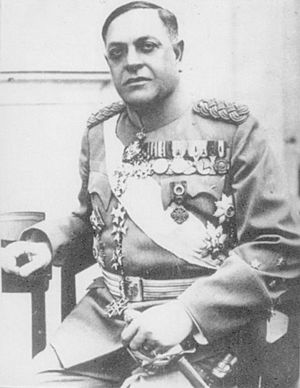
Hitler was worried about Yugoslavia's strong army. But he also worried about Greece and Yugoslavia threatening his plans to invade the Soviet Union. He wanted a political solution for Yugoslavia.
On December 12, 1940, Hungary and Yugoslavia signed a friendship treaty. This was supported by Germany and Italy. But Germany's plan to invade Greece would be easier if Yugoslavia was neutral. For months, Prince Paul faced huge pressure. Germany threatened to attack from Bulgaria. Britain offered little military help.
On January 23, 1941, a US envoy visited Belgrade. He said if Yugoslavia allowed German troops to pass, the US would not help them in peace talks. Around this time, British Prime Minister Winston Churchill ordered British intelligence to contact anti-government groups in Belgrade.
On February 14, Hitler met with Cvetković. He asked Yugoslavia to join the Tripartite Pact. He also wanted Yugoslavia to reduce its army and allow German supplies to pass through. In return, he offered a port on the Aegean Sea and safety for Yugoslavia's land.
On March 1, Bulgaria signed the Pact. German troops arrived at the Bulgarian-Yugoslav border. Yugoslavia was now even more isolated.
On March 4, Prince Paul secretly met Hitler. Hitler again pressured him to sign the Pact. Hitler did not ask for troops to pass through Yugoslavia. He offered the Greek city of Salonika. Prince Paul was unsure. He offered a friendship agreement instead. But Hitler insisted. Prince Paul worried that signing the Pact would lead to his downfall.
On March 17, Prince Paul met Hitler again. Hitler said it was Yugoslavia's last chance to join the Pact. This time, he dropped the request to use Yugoslav railways. Two days later, Prince Paul discussed the Pact with his council. They agreed to sign, but only if Germany made its promises public. Germany agreed.
Three ministers resigned on March 20 to protest the signing. The British encouraged one of them, Srđan Budisavljević. Germany then gave an ultimatum: accept by midnight on March 23 or lose all chances. Prince Paul and Cvetković agreed, even though they thought German promises were "worthless." On March 23, Germany's promises of safety and not using Yugoslav railways were made public.
Yugoslavia Joins the Tripartite Pact
On March 25, the Tripartite Pact was signed in Vienna. Hitler said the event felt like a funeral. German radio announced that Axis powers would not demand troop passage. But the official document only mentioned troops, not war materials. The promise of Salonika was also not in the document.
In Athens, Allied leaders were upset. They saw Yugoslavia joining the Pact as a "worst case scenario" for defending Greece. The next day, Serbian protesters in Belgrade shouted: "Better the grave than a slave, better a war than the pact!"
The Coup Begins
The coup started at 2:15 AM on March 27. It was planned by Air Force officers in Zemun and Royal Guard officers in Belgrade. Only senior Air Force officers were involved. Under General Borivoje Mirković, officers took control of important buildings. These included the Air Force base, bridges, the city administration, and the royal palace. An official helped by cutting off communications across the country. Tanks and artillery were placed on main streets. By 2:00 PM, all key locations were controlled by coup leaders.
Prince Paul was in Zagreb at the time. He was on his way to a holiday. On the morning of March 27, Deputy Prime Minister Maček told him about the coup. They met and discussed the situation. Maček urged Prince Paul to fight the coup. He offered the support of Croatian army units. But Prince Paul refused, partly because his family was still in Belgrade.
Prince Paul returned to Belgrade that evening. General Simović met him and took him to the war ministry. There, Prince Paul and the other two regents gave up their power. The regency was immediately ended. Prince Paul and his family then left for Greece and later went into exile in South Africa.
On the morning of March 27, the royal palace was surrounded. The coup leaders broadcast a radio message. It pretended to be King Peter calling for support. Peter was surprised by the coup. He heard he was now old enough to rule on the radio. Leaflets announcing the coup were dropped from planes.
Protests followed in Belgrade and other cities for several days. Crowds shouted slogans supporting the United Kingdom. They also used the slogan from before the coup: "Better the war than the pact, better the grave than a slave." Members of the League of Communists of Yugoslavia, which was illegal, also joined the rallies.
Churchill said, "Yugoslavia has found its soul." He even thought a Balkan front could be formed with Turkey. The news made Greece try to change its defense plans. Greeks also urged Yugoslavia to attack Italians in Albania. The Polish and Czechoslovakian governments-in-exile praised the coup.
The head of the Serbian Orthodox Church, Patriarch Gavrilo V, welcomed the coup. He spoke publicly supporting the King and the new government. King Peter II was officially sworn in on March 28.
For other groups in Yugoslavia, the idea of war and the government's close ties to the Serbian Orthodox Church were not appealing. Archbishop Aloysius Stepinac, a Catholic leader, wrote in his diary that Croats and Serbs were "of two worlds." He publicly asked Catholic clergy to pray for King Peter and for peace. The coup itself resulted in only one accidental death.
Who Was Behind the Coup?
There are different claims about who led the coup. General Simović, General Mirković, and Major Živan Knežević all claimed to be the leader. Mirković said he planned and organized everything. He said he only told Simović about his idea after deciding to act. King Peter later said the coup was done by "younger and middle ranks" of the army.
Simović, however, claimed he was "in the center of the whole undertaking." He said he asked Mirković to help. Most historians believe Mirković's story is more believable. This disagreement caused problems for the Yugoslav government that later went into exile.
Historian David A. T. Stafford said in 1977 that the British encouraged the coup. But he said the idea came from the Yugoslavs. Later, he apologized for saying the British planned it. However, other historians point to evidence that the plotters depended on British intelligence. Senior British officials met with Simović and Mirković just before the coup. A British agent told Mirković the coup had to happen within 48 hours. Many researchers believe the British intelligence services helped plan the coup.
Some sources also say the Soviet Union actively supported the coup. Soviet intelligence officers were sent to Belgrade to help. The German embassy in Belgrade was sure that British and Soviet intelligence agencies organized the coup.
Some people who knew about the coup included Slobodan Jovanović and Ilija Trifunović-Birčanin. Some coup supporters had ties to secret groups like the "Black Hand." Those who favored the coup included older generals, intellectuals, students, the army, and the Orthodox Church. Generals disliked Prince Paul for various reasons, including being forced into retirement.
What Happened Next?
The New Government
After the coup, Simović's new government did not officially approve Yugoslavia's signing of the Tripartite Pact. But they didn't openly reject it either. Hitler was furious about the coup and anti-German events in Belgrade. He ordered his officers to crush Yugoslavia immediately. Hitler was worried about the British Air Force using bases in Greece and Yugoslavia. These bases could attack his planned invasion of the Soviet Union. On the day of the coup, he ordered that Yugoslavia be treated as an enemy. He also wanted Hungary and Bulgaria to join the attack. He promised them land. Hitler also wanted to encourage tensions within Yugoslavia by supporting Croats.
At the same time, Hitler delayed his invasion of the Soviet Union by about four weeks. This delay was partly because he needed to defeat Yugoslavia first.
On March 30, the new Foreign Minister, Momčilo Ninčić, told the German ambassador that the new government would accept all international agreements. This included joining the Tripartite Pact, as long as Yugoslavia's interests were protected. The German ambassador demanded an apology for the protests. He also wanted the Pact to be approved immediately and the Yugoslav army to be reduced. But he was told by Berlin to avoid contact with Yugoslav officials. He left the next day.
On April 2, orders were given to evacuate the German embassy. Hitler ignored his ambassador's advice that action against Yugoslavia was not needed. On March 31, Germany decided to give Croatia its independence.
German officials worked to create "cries for help" from ethnic Germans, Croats, and others in Yugoslavia. These were published in the press to justify a German invasion. German media also accused Yugoslavia of harming German citizens. This was similar to propaganda used before invading Poland. This media attack also tried to divide Serbs and Croats. It promised Croats a big role in the future.
On April 3, Hitler issued new orders for the invasion plan. Hungary and Bulgaria were promised land. The Romanian army was asked not to join. Also on April 3, a German official arrived in Zagreb to prepare for a new government. A Croatian pilot from the Yugoslav Air Force also defected to the Germans. He took valuable information about Yugoslavia's air defenses.
Simović again named Maček as Deputy Prime Minister. But Maček was hesitant. He stayed in Zagreb to decide. He felt the coup was a Serbian plan against Prince Paul and the Cvetković–Maček Agreement. But he decided to show his party's support for the new government. He also demanded that four Croatian politicians from the old government be included. Simović agreed. On April 4, Maček went to Belgrade and accepted the post. He had conditions: the new government must respect the Cvetković–Maček Agreement and expand Croatia's independence. It also had to respect Yugoslavia's joining the Tripartite Pact.
On April 5, the new government met. It included members from different political groups. Some were strongly against the Axis. Some wanted peace with Germany. Others were undecided. This made the government very divided and weak. It quickly realized it had to follow a foreign policy similar to the previous government.
Agreement with the Soviet Union
On April 5, 1941, the new government signed a Treaty of Friendship and Non-Aggression with the Soviet Union. This agreement said that if one country was attacked, the other would remain friendly. It did not promise military help. The Soviet leader, Joseph Stalin, wanted to show Hitler that the Soviet Union had interests in the Balkans. But he didn't want to upset his ally, Germany. So, the Soviet Union never considered military help for Yugoslavia. This agreement had little real impact on Yugoslavia's situation.
Axis Invasion
Even within the Royal Yugoslav Army, there were divisions. Some favored the Axis, others the Allies. The Axis invasion of Yugoslavia began on April 6. The bombing of Belgrade forced the government to leave the city. King Peter and Simović planned to go into exile. Maček refused to leave. He resigned on April 7 and returned to Zagreb. Three other ministers also refused to leave Yugoslavia. The government met on Yugoslav soil for the last time on April 13. From there, they flew out of the country to Athens. The Soviet Union accepted the invasion of Yugoslavia without criticism.
The coup also ruined the work British intelligence had done with the previous government. By supporting the coup, the British undermined the balance in Yugoslav politics. Serbian nationalists supported the coup because it ended Croatian independence under the Agreement. It also allowed them to pursue a "Greater Serbia" plan. The coup and its aftermath also caused problems for the Yugoslav government-in-exile during the war. This was due to ongoing arguments about the Cvetković–Maček Agreement.
What We Learned from the Coup
The coup and the poor performance of the Yugoslav army during the invasion were studied a lot. It remained a source of pride for Serbian nationalists. Those who wanted to work with the Axis believed that if the coup hadn't happened, Yugoslavia would have stayed neutral. They thought it would have avoided invasion, many deaths, and the rise of communism. They also thought Yugoslavia could have joined the Allies later with less sacrifice. The Communist Party of Yugoslavia saw the coup and invasion as the start of their successful revolution.
In the end, the main importance of the coup was that it questioned Yugoslavia's joining the Tripartite Pact. This led directly to the Axis invasion.
Historians have different views on the coup. Some say it was a brave act of defiance against German control. Others call it a "blunder" based on hopes, not reality. It showed the lack of unity between Serbs and Croats. This limited the military options for the Yugoslav government.
Hitler's decision to invade Yugoslavia delayed his invasion of Greece by five days. But this was made up for by being able to invade Greece through southern Yugoslavia. The role of the coup in delaying Hitler's invasion of the Soviet Union is still debated. Some historians believe it was a "fateful delay" that helped lead to Germany's failure to capture Moscow. Others say other factors determined the start date. More recently, some historians believe the invasion of Yugoslavia did cause some delay.
The coup was a big propaganda victory for Britain. It boosted British morale after victories in North Africa. It also helped the new British Special Operations Executive.
Prince Paul was later found guilty of certain actions related to Yugoslavia joining the Tripartite Pact. In 2011, a Serbian court found that this decision was politically motivated. Prince Paul was officially cleared. A similar decision was made in 2009 for Cvetković.
Images for kids
 | Dorothy Vaughan |
 | Charles Henry Turner |
 | Hildrus Poindexter |
 | Henry Cecil McBay |


